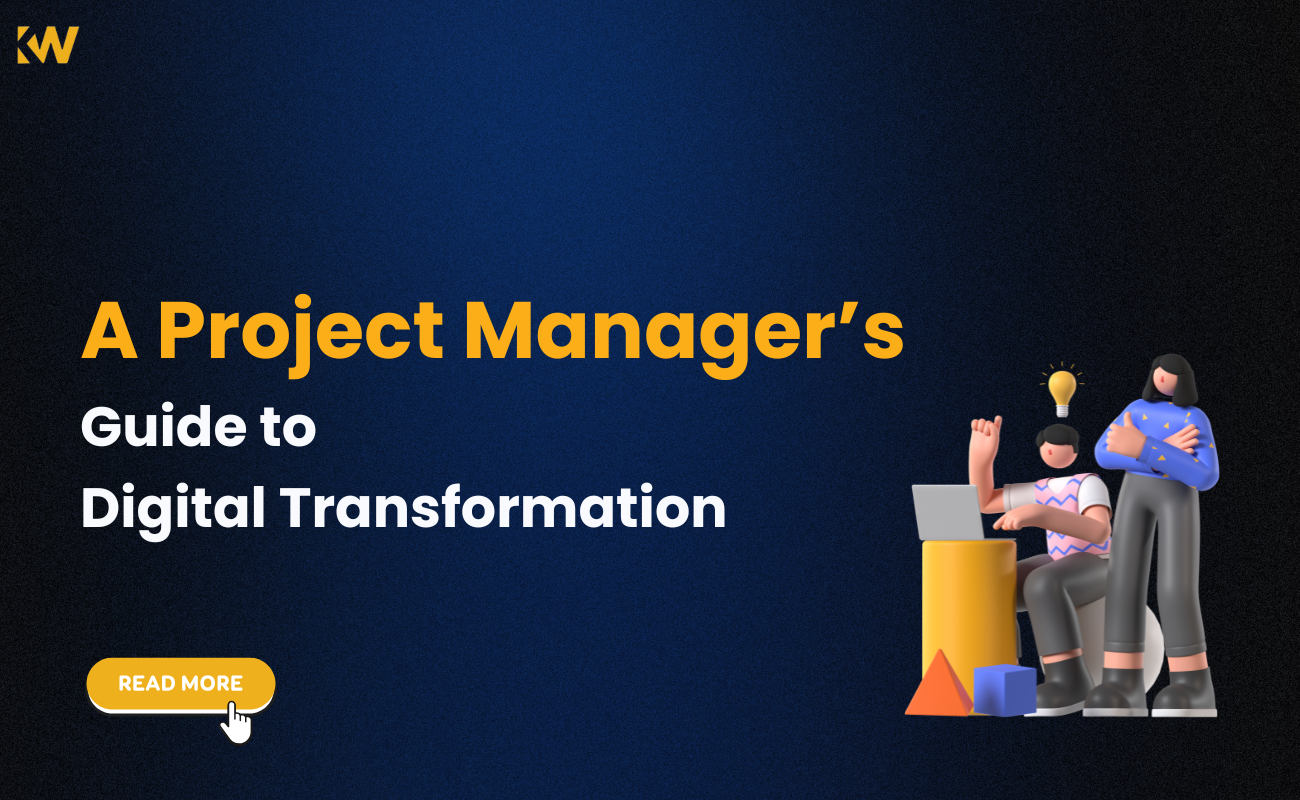
A Project Manager's Guide to Digital Transformation
Posted On December 4, 2024 - 14:50 PM
In the current fast-paced, technology-driven world digital transformation has emerged as an important strategy for businesses looking to boost their efficiency as well as improve the customer experience and stay ahead of competitors. For a manager of projects knowing about digital transformation and the best way to manage projects in the new technology-driven era is vital. This guide will explore what digital transformation means essential, the reasons why it is so as well as how managers of projects can manage the ever-changing landscape to ensure successful outcomes.
What is Digital Transformation?
Digital transformation is how digital technology across all aspects of a business, radically changing the way it operates and providing the best value to its customers. It requires the adoption of new processes, technologies, and strategies that increase efficiency productivity, innovation, and efficiency. Digital transformation usually encompasses aspects like automation, cloud computing, data analytics AI, Artificial Intelligence (AI) machine learning (ML), Internet of Things (IoT) as well as digital platforms.
Digital transformation for businesses can be the difference between succeeding in the digital age and being left behind. The use of modern technologies can help businesses improve efficiency to improve customer experience and generate fresh revenue sources. However, it's not only about technology; it requires a culture change that affects how employees function and how the management influences change.
Why is Digital Transformation Important for Project Managers?
As a project manager being aware of the significance of the digital revolution is essential as it directly impacts how plans are made, implemented and delivered. Here are a few reasons to consider digital transformation:
-
Increased efficiency and productivity: Automation and incorporation of tools digital can reduce manual labour, enhance collaboration, and improve processes. This lets project teams concentrate on more valuable tasks and minimizes the chance of delays, errors and inefficiencies.
-
Enhances Customer Experiences: Utilizing digital tools, companies can better understand the needs of customers and offer personalised services as well as engage with customers in real time. Offering exceptional customer service is now a significant competitive advantage on the market Project managers also play a crucial part in ensuring that the projects meet customers' expectations.
-
Data-driven decision-making: Digital transformation enables companies with a wealth of information that can be examined to make better decisions. Project managers who are embracing data analytics will gain insight into the performance of projects as well as resource allocation and the potential risk, allowing better decisions throughout the entire project's lifecycle.
-
Innovative and competitive advantage: Digital transformation promotes innovation by enabling organizations to adopt new methods of business, technologies and methods. Project managers who manage projects to transform their businesses digitally are in the forefront of promoting this change and helping companies remain competitive in a changing digital world.
-
Flexibility and Agility: Digital tools allow businesses to adjust to the changing conditions of the market and the demands of customers more quickly. As a project manager having the ability to oversee the project fluidly and to implement iterative procedures is vital to navigate the ever-changing digital change.
How Project Managers Can Lead Digital Transformation Initiatives
Effectively managing digital transformation projects demands a blend of leadership abilities as well as a strategic perspective. Here are some key strategies project managers can use to manage digital transformation:
1. Understand the Strategic Vision of the Organization
Before beginning any digital transformation initiative Project managers must be aware of the strategic goals as well as the vision for their business. Digital transformation initiatives should be aligned with the long-term vision of the business and address the most pressing business issues. With these objectives in mind, Project managers can determine the projects that affect the business most, and ensure that all parties are on the same page.
2. Develop a Digital Transformation Roadmap
A roadmap is an important instrument to guide projects to transform their digital capabilities. It can help identify the most important elements, milestones, as well as the resources needed to make digital transformations successfully. Project managers must work closely with key stakeholders and leaders to establish a clear and concise vision of the future, establish goals, and define specific steps to reach the goals of transformation. This roadmap must also contain timeframes, budget estimates, and assessments of risk.
3. Focus on Change Management
One of the most difficult issues in the digital revolution is the culture change that it brings. Some employees may be hesitant to change, especially when it involves implementing new working practices and technologies, project manager need to implement an effective change management plan to address any concerns, create acceptance, and offer the required support to assist employees adapt to a new way of working.
Communication strategies, training programs and support for leadership are crucial elements of a successful change management strategy. By making sure that employees comprehend the advantages that digital technology brings and being provided with the knowledge and tools they require Project managers can guarantee an easier transition.
4. Leverage Agile Methodology
Digital transformation projects can be complicated and dynamic, necessitating flexibility and flexibility. Agile methods for managing projects work well for these projects due to their ability to allow constant feedback, continuous development and fast adjustments. Agile methods, such as Scrum or Kanban are a great way to encourage collaboration with transparency and concentration on delivering value within short time frames.
Project managers should look into adopting agile frameworks while managing digital transformation projects. This strategy not only ensures that the project remains on track, but can also allow groups to be receptive to changes in requirements in technology, new developments, and the changing market environment.
5. Embrace Data and Analytics
Data is the foundation of digital transformation and project managers have to utilize data to guide decisions. With the help of data analytics tools, project managers can monitor project progress, assess the risk of a project and assess the performance in digital projects. Data analytics also can provide insight into the behaviour of customers as well as market trends and business performance, which can help project managers make better-informed decisions and adjust their project strategies in line with their needs.
The use of performance measures and key performance indicators (KPIs) helps project managers to evaluate the effectiveness of digital transformation initiatives. The monitoring of these metrics helps ensure that the process is in line with the business goals and the company is seeing tangible improvements.
6. Foster Collaboration Across Teams
Digital transformation usually requires multiple teams, departments and other stakeholders working in tandem. Project managers need to foster collaboration and coordination across different groups, and ensure that everyone is in sync and working towards common objectives. This might involve forming cross-functional teams, arranging regular check-ins and using digital tools for collaboration that allow seamless communication and sharing of information.
Effective collaboration means that knowledge is shared, problems are spotted early and solutions are quickly implemented, eventually making for a more efficient transition process.
7. Manage Risks Effectively
Similar to any other endeavour digital transformation initiatives are also rife with risk. They can be a result of technical issues, like integration issues with systems as well as organizational risks like resistance from employees to changes. Project managers need to be proactive in identifying the risks, evaluating them, and reducing risks throughout the life cycle of the project.
Utilizing strategies for managing risk, including developing contingency plans, keeping track of the progress and fixing issues when they arise, helps ensure that the project remains on course and risks are reduced. Tools for managing risks like risk registers as well as mitigation plans are vital to keep the digital transformation project on track.
8. Ensure Continuous Improvement and Innovation
Digital transformation isn't only a once-in-a-lifetime event. It is a continuous process of constant improvement and new ideas. As new technologies develop and business requirements evolve project managers must ensure that their organization is flexible and capable of adapting to the shifts. Inspiring a culture of creativity and continuous learning within the project team can help ensure that the digital transformation efforts will continue to provide benefits over the long run.
Project managers must regularly evaluate the effects of digital efforts, collect feedback from their stakeholders and make changes as necessary to ensure ongoing expansion and enhancement.
Conclusion
Digital transformation isn't just about embracing new technologies, it's about altering the way companies operate and provide value to their customers. Being a manager of projects managing digital transformation projects requires a blend of strategic thinking, effective leadership and technical knowledge. By connecting projects to business objectives by encouraging collaboration and utilizing agile approaches Project managers can ensure that digital transformation initiatives will be successful and bring long-term advantages to the business.
In a time where disruption by technology is normal, project manager have to stay at the front of that change in driving innovation, creating change, and adding value. With the right tools and strategies as well as the right mindset project managers can successfully manage the complexity of digital disruption and lead their teams towards success in the digital era.


















